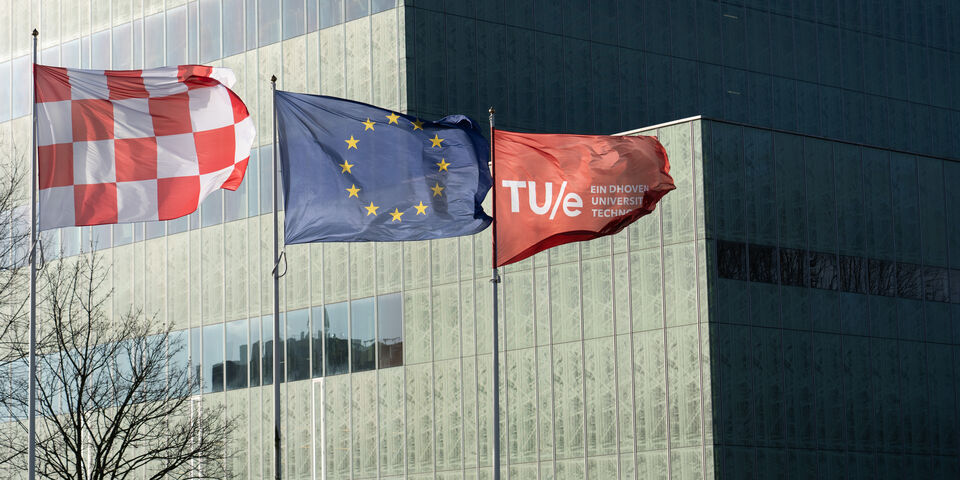Stir over ‘new’ collaboration between TU/e and Technion
A controversy has erupted around a European Horizon project in which both TU/e and Technion are participating—the Israeli university with which all institutional ties have been frozen since June. According to the activist group EindhovenStudents4Palestine (ES4P), this violates TU/e’s own guidelines. The university sees it differently.
The project in question is REACT, part of the European research program Horizon Europe (see box), which officially launched on June 24. This was only eight days after TU/e announced it would freeze its institutional ties with the Israeli university Technion (see box), citing its “undeniable” links to the Israeli defense sector.
This prompted ES4P to speak out once again, urging TU/e to take action. In a press release, the group stated that this new collaboration contradicts the university’s stated policy. “These measures are misleading and serve as a delaying tactic to maintain existing financial ties with Israeli partners.”
Not New
TU/e disputes that this is a “new” collaboration. According to spokesperson Ivo Jongsma, preparations for the project began in early 2023, with the proposal submitted to the European Commission (EC) in November 2024. On April 16, 2025, the general manager of the Department of Electrical Engineering (EE) officially approved the department’s participation. “That was two months before TU/e’s decision. June 24 is simply the date the EC granted its approval,” Jongsma said.
The university also does not classify this as institutional collaboration (see box). According to Jongsma, the project falls under the Marie Skłodowska-Curie Actions (MSCA) program. “These projects always involve the training of PhD candidates in specific research areas. At TU/e, responsibility for these projects lies with the departments, which is why we don’t regard them as institutional collaborations. Institutional collaborations require the Executive Board’s signature.”
Moral Complicity
A total of eleven universities are taking part in Horizon REACT, including TU/e and Technion. The University of Groningen is coordinating the project and receives the largest EU contribution—over €900,000. Technion receives just over €600,000, twice the amount allocated to most of the other universities. In total, Europe is contributing more than €4.5 million. Each university will supervise one or more PhD candidates. TU/e will train one candidate in Eindhoven.
Their research focuses on developing an electronic platform that mimics human self-awareness—a field known as neuromorphic computing. The goal is to create highly intelligent machines that could be used in a variety of everyday applications, ranging from self-driving cars to advanced navigation assistants.
Dual Use
ES4P argues that such technology—and others like it—could also be applied to military purposes. The group has long raised concerns about “dual-use” research. According to ES4P, collaborating with Israeli universities and companies may lead to moral complicity, even when projects are civilian in nature. In addition to universities, six companies are also involved in Horizon REACT.
TU/e, however, sees no risk of serious human rights violations arising from Horizon REACT. “The output is not new technology, but highly trained experts and scientific publications,” Jongsma emphasized. “Moreover, TU/e’s contribution involves no direct contact with Technion.”
Although the university currently sees no reason to halt the project, it will be reviewed by the soon-to-be-established Committee for Sensitive Collaborations (see box) once work begins. “As soon as the committee is operational, it will review all sensitive collaborations and programs, starting with existing projects and programs involving Israeli institutional partners,” Jongsma added.
Concerns
ES4P has serious doubts. “The mandate and principles of the committee are formulated in such a way that responsibility is handed over to a body created by the university itself—one that has no real decision-making authority,” the group wrote in its press release.
The activists also argue that the establishment of the committee is moving far too slowly. “It will take at least six months before the committee is fully set up and able to assess projects. That’s nowhere near fast enough,” a spokesperson said during last week’s campus protest.
In its press release, ES4P demands that TU/e align its policy with its values: “respecting fundamental human rights and international law.” The group calls for all ties with Israeli academic and industrial partners to be severed.
Horizon Europe
Horizon Europe is the European Union’s main research and innovation program for 2021–2027, with a budget of approximately €95.5 billion. It aims to promote scientific excellence, tackle societal challenges, and keep Europe technologically competitive.
TU/e and Technion
TU/e has previously collaborated with Technion and other Israeli partners through European research programs such as Horizon Europe. In light of the situation in Gaza, the university announced on June 16 of this year that it would temporarily halt all new institutional collaborations with Israeli institutions, including Technion. Existing collaborations will be reviewed by a specially established ethics committee. Individual researchers may remain involved in limited ways.
Committee for Sensitive Collaborations
On July 15, TU/e issued a document outlining how it will handle sensitive projects and defining the scope of the Committee for Sensitive Collaborations. It sets out interim principles for evaluating whether projects can proceed pending the committee’s formal establishment. The Horizon project described in this article was reportedly approved based on these criteria.
Institutional Collaboration
TU/e defines institutional collaboration as a strategic, long-term (more than five years) reciprocal partnership between TU/e and one or more external partners, formalized in an agreement that requires the Executive Board’s signature. Projects (such as Horizon projects) that arise from institutional collaborations do not themselves count as institutional collaborations.
This article was translated using AI-assisted tools and reviewed by an editor.



Discussion